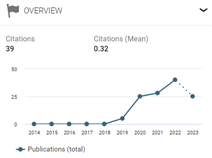Hubungan kebiasaan konsumsi dan status gizi dengan kejadian GERD pada mahasiswa saat puasa
DOI: 10.30867/gikes.v6i1.2266Abstract
Background: GERD is a pathological condition caused by the reflux of stomach contents into the esophagus. Diet is a factor in the occurrence of GERD in adults, including students and workers. Factors that cause GERD recurrence include stress and diet.
Objectives: To determine the intake of micronutrients, fiber, frequency of tea consumption, and nutritional status during the fasting month on the occurrence of GERD in students.
Methods: Observational quantitative research method with a cross-sectional research design, purposive sampling data collection. Respondents numbers were 81 people fasting and students at the Faculty of Health, Universitas Muhammadiyah Gresik. This Research in Health Faculty, Universitas Muhammadiyah Gresik. Data collection through interviews with 2x24 hour food recall questionnaires, Food Frequency Questionnaire (FFQ), calculation of Body Mass Index (BMI) and Gastroesophageal Reflux Disease Questionnaire (GERD-Q). Data analysis used the Shapiro-Wilk test and Spearman test.
Results: Respondents were aged between 18 years and 24 years. The statistic test with spearman test showed a relationship between tea-drinking habits (p=0,010) and noodle consumption habits (p=0,001) with GERD. Analysis of the relationship between intake of fiber (p=0,472), micronutrient intake of vitamin A (p=0,228), vitamin C (p=0,964), calcium (p=0,471), iron (p=0,647), zinc (p=0,757), and nutritional status (p=0,594) with GERD.
Conclusion: There is a relationship between tea-drinking habits and the habit of consuming noodles and GERD. There was no relationship between intake of fiber, vitamin A, vitamin C, calcium, iron, zinc, and nutritional status with GERD.
Keywords
Full Text:
PDFReferences
Ahmadi, A. A. Hubungan pola makan dan jenis asupan dengan dispepsia fungsional pada mahasiswa tahun pertama preklinik dan Klinik Fakultas Kedokteran UIN Syarif Hidayatullah Jakarta (Bachelor's thesis, Fakultas Kedokteran UIN Syarif Hidayatullah Jakarta).
Ajjah, B. F. F., Mamfaluti, T., & Putra, T. R. I. (2020). Hubungan pola makan dengan terjadinya gastroesophageal reflux disease (Gerd). Journal of Nutrition College, 9(3), 169–179. https://doi.org/10.14710/jnc.v9i3.27465
Al Rahmad, A. H. (2023). Scoping Review: The Role of Micronutrients (Fe, Zn, Iodine, Retinol, Folate) During Pregnancy. Jurnal Kesehatan Manarang, 9(1), 1–13. https://doi.org/https://doi.org/10.33490/jkm.v9i1.812
Ardhan, F. R., Catarina Budyono, & Rifana Cholidah. (2022). Hubungan pola makan dengan kejadian gastroesophageal reflux disease pada mahasiswa Fakultas Kedokteran Universitas Mataram. Unram Medical Journal, 11(1), 806–811. https://doi.org/10.29303/jku.v11i1.647
ASDI, P. A. G. I. (2019). Penuntun Diet dan Terapi Gizi. Edisi Ke-4. Jakarta: Penerbit Buku Kedokteran EGC.
Bohamad, A. H., Aladhab, W. A., Alhashem, S. S., Alajmi, M. S., Alhumam, T., Alqattan, D. J., & Elshebiny, A. M. (2023). Impact of Ramadan Fasting on the Severity of symptoms among a cohort of patients with gastroesophageal reflux disease (GERD). Cureus, 15(3). https://doi.org/10.7759/cureus.36831
BPS. (2023). Jumlah kasus 10 penyakit terbanyak rawat jalan rumah sakit di Kabupaten Gresik 2021-2022. In Badan Pusat Statistika Gresik. https://gresikkab.bps.go.id/indicator/30/228/1/jumlah-kasus-10-penyakit-terbanyak-rawat-jalan-rumah-sakit-di-kabupaten-gresik.html
Cahyawati, P. N. (2018). Transport, metabolisme dan peran vitamin A dalam imunitas. WICAKSANA: Jurnal Lingkungan dan Pembangunan, 2(2), 43-47.
Chao, H. C. (2023). Zinc deficiency and therapeutic value of zinc supplementation in pediatric gastrointestinal diseases. Nutrients, 15(19), 1–18. https://doi.org/10.3390/nu15194093
Dewi, D. K., Priyanti, S. O., Alam, D. R. M., & Darwis, D. (2024). Relevansi antara puasa dengan kesehatan fisik pada remaja. Turabian: Jurnal Pendidikan Islam, 2(2), 64-75.
Ellenczynska, R., & Magdalena. (2022). Hubungan pola makan, konsumsi makanan dan minuman iritatif dengan kejadian dispepsia relationship between dietary pattern, irritative food and drink consumption with incidence of dyspepsia. Jurnal Riset Pangan dan Gizi, 4(2), 1–8. https://ejurnalpangan-gizipoltekkesbjm.com/index.php/JR_PANZI/article/download/180/89
Fahriska Hasibuan, W., Aida Larasati, T., Aulia Syahdifva Harahap, N., Shanel, B., Lap Golf, J., Tengah, K., Pancur Batu, K., & Deli Serdang, K. (2024). Pola makan remaja sebagai faktor risiko penyakit Gerd. Jurnal Ilmu Kesehatan dan Gizi, 2(3), 32–41. https://doi.org/10.55606/jig.v2i3.3019
Ferdayani, D. O. (2023). Manfaat puasa terhadap penyakit maag. Jurnal Religion: Jurnal Agama, Sosial, dan Budaya, 1(2023), 822–829.
Fuadillah, A., Sholikhah, D. M., & Supriatiningrum, D. N. (2023). Hubungan pola makan dan gastroesophageal reflux disease terhadap status gizi Mahasiswa Tingkat II Fakultas Kesehatan Universitas Muhammadiyah Gresik. Ghidza Media Jurnal, 5(1), 1. https://doi.org/10.30587/ghidzamediajurnal.v5i1.6173
Hardinsyah, S. I. (2021). Ilmu Gizi: Teori & Aplikasi. Penerbit Buku Kedokteran EGC.
Herdiana, Y. (2023). Functional food in relation to gastroesophageal reflux disease (GERD). Nutrients, 15(16). https://doi.org/10.3390/nu15163583
Iswari, R. S., Arini, F. A., Sandra, L., Purwaningsih, D., & Yuniastuti, A. (2022). Biokimia Gizi. Jakarta: GalionoDigdaya Kawthar. Punjungsari, TN (2023). SNP (Single Nucleotide Polymorphism) at Adiponectin Gene in Type, 2.
Kemenkes. (2024). Kelompok Usia Dewasa 19-59 Tahun. https://ayosehat.kemkes.go.id/kategori-usia/dewasa
Khasanah, T. A., & Safilah, F. (2023). Hubungan kebiasaan konsumsi kopi dan kualitas tidur dengan status gizi pada remaja di Kelurahan Jagakarsa Jakarta Selatan. Jurnal Andaliman: Jurnal Gizi Pangan, Klinik dan Masyarakat, 3(1), 41. https://doi.org/10.24114/jgpkm.v3i1.46401
Mardhiyah, R., Makmun, D., Syam, A. F., & Setiati, S. (2016). The effects of ramadhan fasting on clinical symptoms in patients with gastroesophageal reflux disease. Acta medica Indonesiana, 48(3), 169–174.
Maradjabessy, N. F. R., Kusadhiani, I., & Warella, J. C. (2023). Kejadian gastroesophageal reflux disease (gerd) berdasarkan skor gerd-q pada mahasiswa Fakultas Kedokteran Universitas Pattimura Tahun 2023. PAMERI: Pattimura Medical Review, 5(2), 76-84.
Mata, P., Kearsipan, P., Ap, K. X., & Smk, D. I. (2018). Faktor-faktor yang mempengaruhi pola makan mi instan di Kalangan Mahasiswa di Yogyakarta. Medika Respati Jurnal Ilmiah Kesehatan, 13(20), 59–70.
Mawitjere, M. C. L., Amisi, M. D., & Sanggelorang, Y. (2021). Gambaran asupan zat gizi makro mahasiswa semester IV Fakultas Kesehatan masyarakat Universitas Sam Ratulangu saat pembatasan pandemi Covid-19. Jurnal Kesehatan Masyarakat, 10(2), 1–11.
Peraturan Menteri Kesehatan Republik Indonesia Nomor 28, 1 (2019).
Pusfitasari, N., Sopiah, P., & Sejati, A. P. (2024). Types Of Food That Cause Gastritis (A Systematic Review). HealthCare Nursing Journal, 6(2), 251-261.
Radjamin, I. S. P., Nusi, I. A., & Kalanjati, V. P. (2019). Profil penderita gastroesophageal reflux disease (gerd) dan non-erosive reflux disease (nerd) di RSUD dr. Soetomo Surabaya. Majalah Bioformologi, 29(1), 13–18.
Rahardiantini, I., & Sartika, L. (2023). Pola makan dan karakteristik mahasiswa terhadap gangguan dispepsia. Jurnal Keperawatan, 13(1), 1-6.
Rahayu, A. (2020). Buku Ajar: Dasar Dasar Gizi.
Sanif, R., & Nurwany, R. (2017). Vitamin A dan perannya dalam siklus sel. retina, 7(10), 11.
Sholicha, C. A., & Muniroh, L. (2019). Hubungan asupan zat besi, protein, vitamin C dan pola menstruasi dengan kadar hemoglobin pada remaja putri di SMAN 1 Manyar Gresik. Media Gizi Indonesia, 14(2), 147-153.
Syam, A. F., Aulia, C., Renaldi, K., Simadibrata, M., Abdullah, M., & Tedjasaputra, T. R. (2013). Revisi konsensus nasional penatalaksanaan penyakit refluks gastroesofageal (Gastroesophageal Re ux Disease/GERD) di Indonesia.
Tarigan, R., & Pratomo, B. (2019). Analisis faktor risiko gastroesofageal refluks di RSUD Saiful Anwar Malang. Jurnal Penyakit Dalam Indonesia, 6(2), 78. https://doi.org/10.7454/jpdi.v6i2.306
Zhang, M., Hou, Z. K., Huang, Z. B., Chen, X. L., & Liu, F. Bin. (2021). Dietary and lifestyle factors related to gastroesophageal reflux disease: A systematic review. Therapeutics and Clinical Risk Management, 17, 305–323. https://doi.org/10.2147/TCRM.S296680
Refbacks
- There are currently no refbacks.













